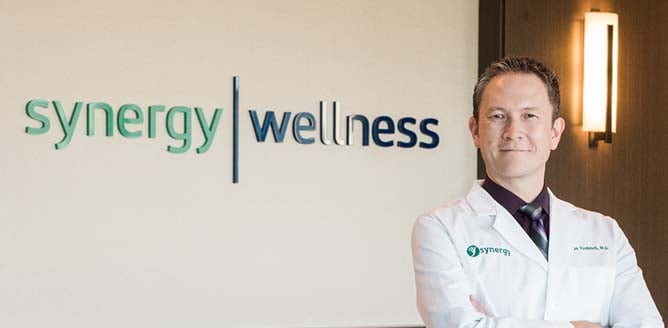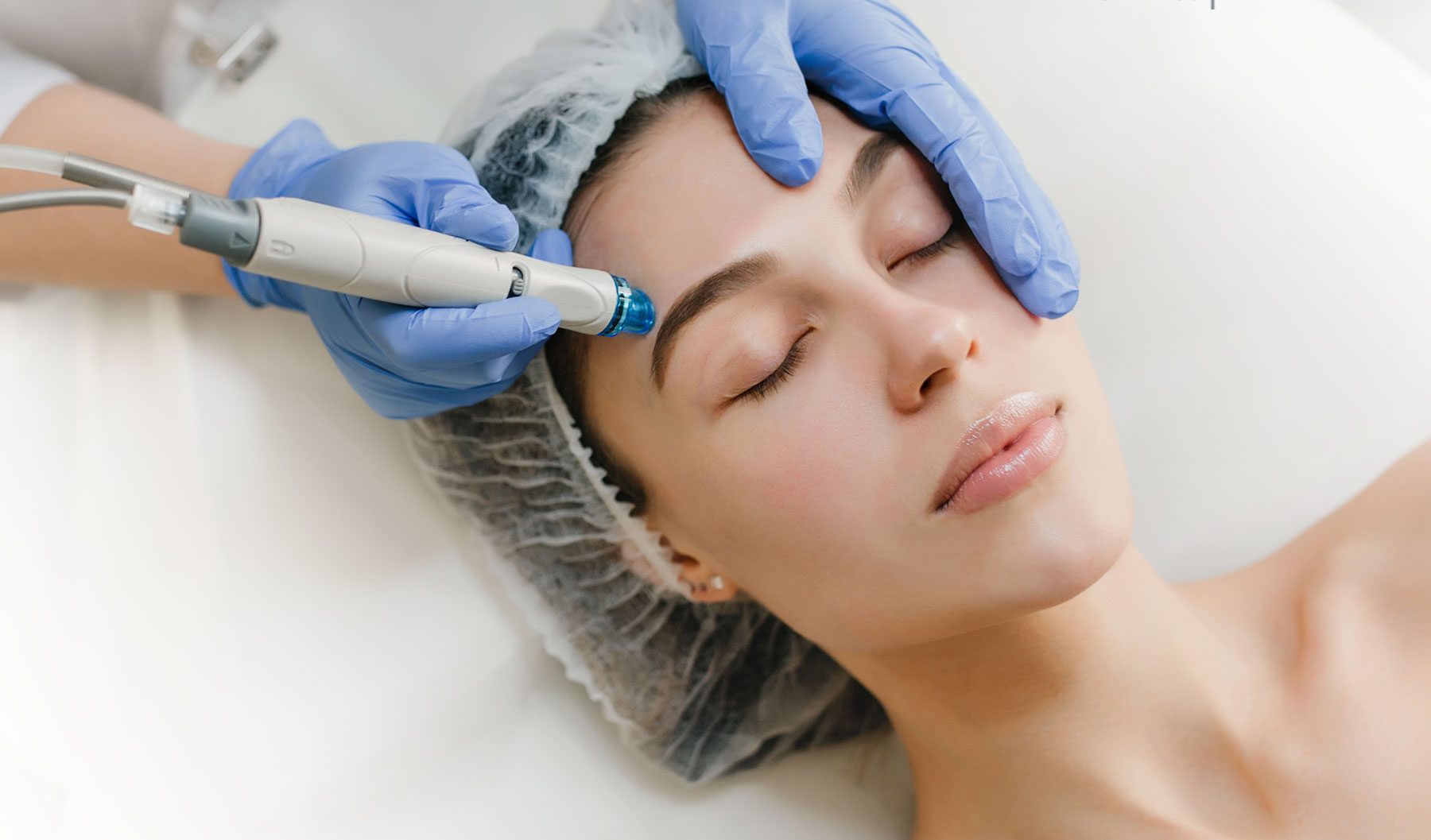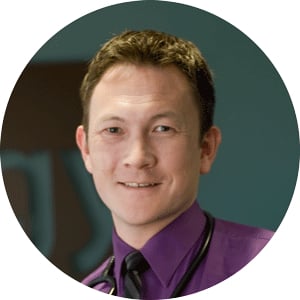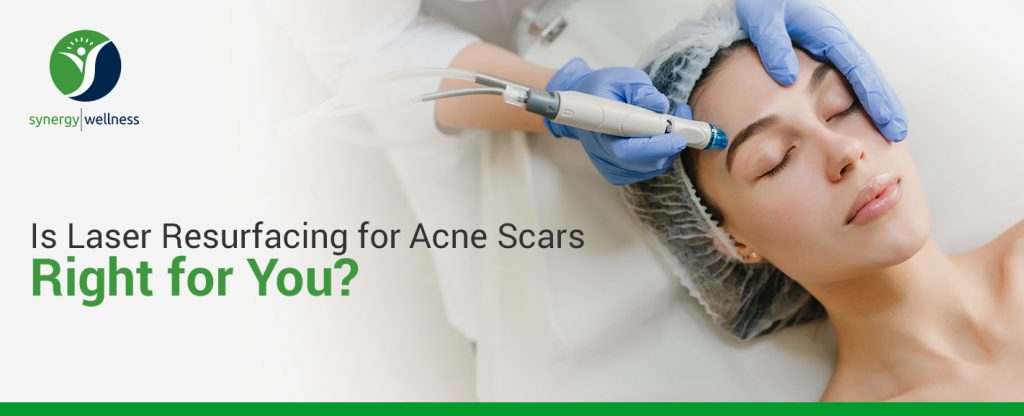
Laser resurfacing can significantly reduce the appearance of scars in many patients. This treatment works to remove damaged layers of skin and stimulate healthy skin cell growth. Whether laser acne scar removal is right for you depends on various factors, so it’s important to have a consultation with a dermatologist to determine what treatment is right for your skin type.
How Do Acne Scars Form?
Acne scars form when the body attempts to repair damage after acne breakouts penetrate the skin and damage layers of tissue beneath it. Acne breakouts are inflamed lesions that can include pustules, papules or cysts. These blemishes occur when a pore or follicle fills with excess bacteria, oil or dead skin cells and swells as a result.
When a pore or follicle swells, a break forms in the wall of the follicle. Minor breaks near the skin’s surface can heal quickly, but deeper breaks can cause infected material to spread further and damage healthy skin tissue.
Inflammatory acne can make a person more prone to developing acne scars as their skin heals from breakouts. Inflammatory acne is usually red, swollen and painful, and it often includes nodules and acne cysts. It typically penetrates layers of skin deeper than regular acne does, so it can cause extra damage, especially if it is left untreated. The risk of scarring increases the longer a person struggles with inflammatory acne, so it’s important to seek treatment for it early.
Acne scars are more likely to occur when a person squeezes, pops or picks at acne because it increases inflammation in the skin. Genes also affect a person’s chances of developing acne scars. If they have a blood relative who struggled with acne scars, it can increase their chances of also developing acne scars.
Types of Acne Scars
The type of acne that a person develops and how they treat it will determine the kind of scarring that occurs. In order to heal breaks in swollen follicles, the body produces collagen, which is a substance that makes skin strong and flexible. Scars form when the body produces too much or too little collagen during the healing process. Different types of acne scars form depending on how much collagen the body produces as it attempts to heal blemishes.
Depressed Acne Scars
Atrophic acne scars are depressed scars that resemble small pits in the skin, and they form when the body produces too little collagen during the healing process. The lack of needed collagen causes the skin to lose some of its tissue in the area of the blemish. A person has a higher risk of developing depressed scars if they squeeze or pop blemishes.
Wider depressed acne scars are often called box-car scars, and deeper scars are often called ice-pick scars due to their appearances. Scars with sloping edges and varying depths are called rolling scars, and they can give the skin an uneven or wavy appearance. Depressed scars can be the same color as the skin, but they can also be a darker or pinkish color.
Raised Acne Scars
Hypertrophic scars are thickened, raised scars that form when the body produces too much collagen during the healing process. The excess collagen forms a mass of scar tissue that builds up and raises on the skin’s surface. Raised scars occur more commonly in people with skin of color such as people with Asian, African American or Hispanic backgrounds.
How Does Laser Scar Acne Removal Work?
Laser scar acne removal works by stimulating new and healthy skin cells to grow. It can reduce the appearance of scars, decrease itchiness or pain and give the skin around the scar an improved range of motion. During acne scar treatment, Dermatologists use a laser to penetrate the outer layers of the skin and remove damaged layers. This stimulates the skin to grow new cells to replace the old, damaged tissue and more uniform scars to replace the old scars.
Doctors can use a variety of lasers to affect the skin in different ways. Depending on the wavelength of light, lasers can remove the top surface of the skin or they can affect the deeper layers while leaving the skin’s surface intact. Doctors will closely evaluate scars to determine the most effective laser and form of treatment to use.
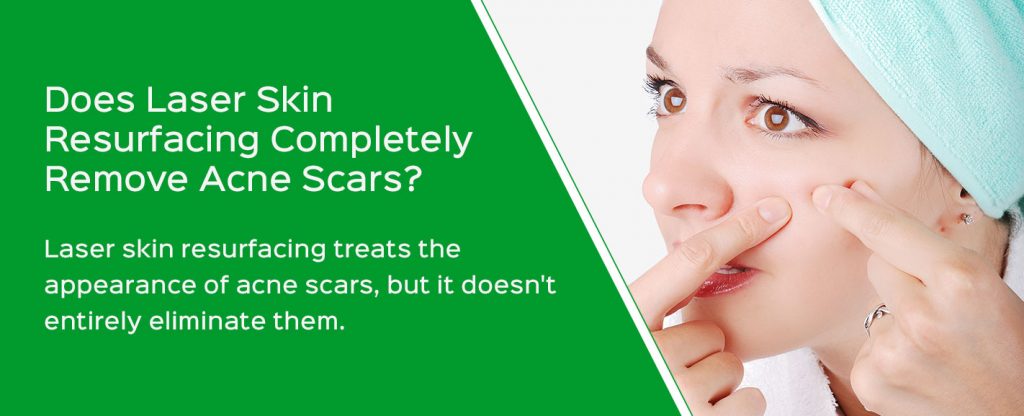
Does Laser Skin Resurfacing Completely Remove Acne Scars?
Laser skin resurfacing treats the appearance of acne scars, but it doesn’t entirely eliminate them. The goal of acne scar treatment is not to remove the scars but to make them less noticeable. Laser scar treatment can reduce the redness of scars and make them appear smoother or more even with the surface of the skin. Ultimately, it can improve the tone and texture of the skin.
Oftentimes, more than one laser treatment may be needed to fully improve the appearance of scars. In many cases, doctors may recommend multiple laser treatments to treat the appearance of scars, or they may recommend a combination of different treatments to work with laser therapy.
How to Prepare for Laser Skin Resurfacing
To get the best results from laser skin resurfacing, it’s important to do some things to prepare your skin before your procedure. It’s also vital to avoid certain things leading up to your procedure to protect your skin. Your dermatologist will give you instructions on how to care for your skin before your procedure.
What to Do for the Best Results
Since laser skin resurfacing procedures can cause bacterial infections, your doctor may recommend or prescribe an antiviral medication. Taking an antiviral medication before your laser scar removal treatment can reduce your chances of infection. Your doctor may prescribe an oral or topical medication, and it’s important to take the medication as prescribed to prevent infection.
Doctors will often recommend clothing that is loose and easy to remove and put on depending on the part of the body that will receive treatment. It’s also important to make sure your skin is clean and free of any substances like perfumes or lotions on the day of your procedure because these can interfere with the laser treatment.
What to Avoid
- Sun exposure: Doctors cannot perform laser treatment on your skin if you have a tan or sunburn from exposure to ultraviolet light. Treatment on sun-damaged skin can cause irregular pigmentation or permanent damage to the treated parts of your skin. Doctors recommend avoiding sun exposure for at least two months leading up to your procedure. Depending on the time of year, it may be impossible to completely avoid the sun, so ask your doctor about sun protection products you can use in the months before your procedure.
- Harsh skincare products: For two to four weeks before your procedure, you should avoid skincare products that contain a retinoid or glycolic acid. Check the ingredients on products closely before using them and only use products that are gentle on your skin.
- Medications or supplements that can increase bleeding: Before treatment, it’s important to avoid medications such as aspirin or nonsteroidal anti-inflammatory drugs (NSAIDS) like ibuprofen. You should also avoid herbal supplements such as ginkgo biloba and garlic. These can increase the risk of bleeding and interfere with treatment as well as the healing process.
- Smoking: You should avoid smoking for at least two weeks leading up to your procedure. Smoking can hinder blood circulation and decrease the skin’s ability to heal.
- Other skin treatments: Other cosmetic procedures such as waxing, collagen injections and chemical peels can interfere with laser treatment, so it’s important to avoid these treatments before a laser resurfacing procedure.
What to Expect During and After an Acne Scar Laser Procedure
Before beginning a laser treatment, your doctor will clean the area of the skin to be treated and apply gauze or wet towels on the skin around your scars to protect healthy skin. They will also apply numbing cream or inject a local anesthetic into the skin to reduce discomfort during the procedure. If you are undergoing treatment for scars on your face, you’ll wear goggles to protect your eyes.
During treatment, your doctor will carefully move the laser over your scar tissue and occasionally apply a water solution or cooling saline to soothe the skin. When the procedure is over, they will apply an ointment to aid healing as well as a clean dressing to protect the treated skin. Following treatment, most doctors will recommend that patients apply moisturizing lotion to the treated skin and avoid wearing makeup until the redness clears.
After an acne scar laser procedure, most people notice a clear and smooth appearance on their skin after about two weeks. However, some people don’t notice improvements until a few months after their procedure depending on their skin type. Skin continues to produce new collagen for up to six months following laser treatment, so you may experience gradual improvements after your procedure.
Does Laser Acne Scar Treatment Hurt?
Pain during a laser acne scar treatment can vary from person to person, but it is usually minimal. Many patients describe the treatment as irritating rather than painful, and some compare the sensation to that of snapping a rubber band against the skin. Your doctor will apply a topical anesthetic to reduce discomfort during the procedure.
For several hours following a laser scar treatment, a person may experience swelling and a mild stinging sensation. For a few days after treatment, some people report feeling like they have a sunburn. This is because the skin is usually redder and more swollen in the first few days after treatment.
Side Effects of Laser Skin Resurfacing
During and after treatment, acne scar laser procedures can cause sensitivity, swelling, discomfort, redness, minor bleeding, skin crusting, bruising and infection. Other potential side-effects can include additional scars, worsened scars, permanent discoloration and worsening acne. The potential side effects of treatment depend on which type of laser a doctor uses during the procedure, the severity of the scars and a person’s skin type.
The most common side effects of treatments that use a pulsed-dye laser (PDL) or an intense pulsed light laser (IPL) are swelling, redness and occasional bruising. In rare cases, pigmentary change or blistering can occur. The most common side effect of treatments that use a fractionated resurfacing laser is redness. However, this type of laser can also cause additional scarring if it is used too aggressively.
To lessen side effects and reduce potential risks, doctors will carefully evaluate your scars and skin type to determine which type of laser will be the most effective and safest for you.
Will You Need Follow-Up Treatments?
To maintain the results of laser acne scar treatment many people need one to six follow-up treatments. On average, people need to undergo two or three treatments to fully improve the appearance of acne scars, but you may need more treatments depending on your scars and skin type. To determine if you will need follow-up treatments, your doctor will examine your skin to see how it reacts to the first treatment and if it would benefit from further treatments.
Patients notice better results and may need fewer treatments when they take care of their skin following a laser acne scar treatment. It’s important to follow your doctor’s care instructions after your treatment, which may include keeping the area clean, using a gentle moisturizer and avoiding sun exposure.
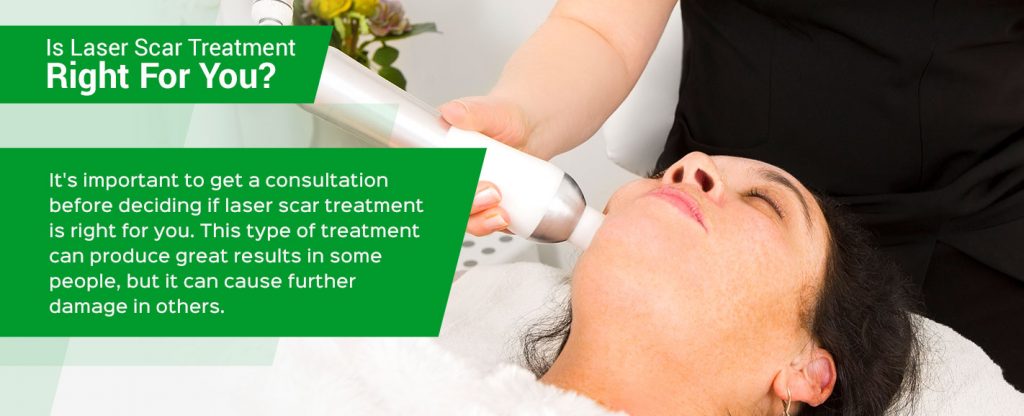
Is Laser Scar Treatment Right For You?
It’s important to get a consultation before deciding if laser scar treatment is right for you. This type of treatment can produce great results in some people, but it can cause further damage in others. A dermatologist can carefully examine your scars and skin type to determine if laser scar treatment will benefit you.
Laser scar treatment is most effective on very light skin with dark scars since the laser is attracted to pigment, but it can work for any skin type whether it is very dark or very light. This type of treatment works best in patients who are physically healthy and without any skin diseases or active acne in the area to be treated. It is not an ideal treatment for patients who smoke or who can treat their acne scars with over-the-counter treatments.
What Alternatives Are There to Reduce the Appearance of Acne Scars?
If laser resurfacing isn’t right for you, or if you would like to try other methods first, there are various alternatives that you can try. These alternative acne scar treatment methods work in different ways to stimulate healthy skin growth, and many of them are over-the-counter treatments that can be done at home. It’s important to make sure that you purchase products from a reputable source to make sure you don’t use any harmful substances on your skin.
Microneedling
Microneedling is a procedure that uses a small device to poke the skin with small sterilized needles. The needles improve tissue growth and healing by stimulating the skin to produce collagen. It can help with other skin conditions such as enlarged pores, fine lines and wrinkles.
Facial Fillers
Dermatologists can inject dermal fillers, which are also known as facial fillers, into the skin to stimulate collagen production or raise depressed areas of the skin caused by acne scars. To ensure a safe procedure, trained medical professionals are the only ones who should administer facial fillers.
Chemical Peels
Chemical peels remove the top layer of the skin to eliminate dead skin cells and stimulate the production of new, healthy skin cells. This stimulates the body to produce collagen, which can help to fill in acne scars. A chemical peel can lighten dark spots, smooth the tone and texture of the skin and unclog pores to prevent further breakouts.
Topical Treatments
Topical treatments can improve the appearance of scars and help to prevent further breakouts. Topical treatments like retinoids and certain acids are applied directly to the skin. Topical retinoids can help to reduce the appearance of acne scars by stimulating cell growth and blocking inflammation. It’s important to wear sunscreen while using retinoids because they can make your skin sensitive to sunlight.
Salicylic acid can reduce the appearance of scars because it reduces swelling and redness. It also helps to clear pores so that it’s free of dead skin cells, dirt and bacteria that cause acne to develop. Other forms of topical treatments include alpha hydroxy acids, lactic acid and natural remedies such as coconut oil and other substances. It’s important to test topical treatments on a small area of skin before using them regularly because they can cause irritation or dryness in certain skin types.
Schedule a Consultation for Laser Skin Resurfacing in Bakersfield
Laser skin resurfacing produces great results in many patients. It can stimulate healthy skin cell growth and significantly reduce the appearance of acne scars to help you feel more confident.
Synergy Wellness will carefully examine your skin to determine the best treatment method to help produce the best results. Contact us to schedule a consultation and find out if laser skin resurfacing is right for you.

